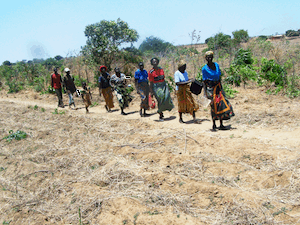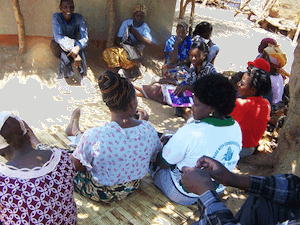When the World Renew and its partner, the Church of Central Africa Presbyterian (CCAP), began programs in Samuel village in Zambia several years ago, the community did not allow women to lead or make decisions.
For example, when they were asked to choose an Agricultural Volunteer Worker (AVW) to serve as the community’s primary representative to the CCAP research and development agriculture program, the community automatically selected one of its men — even though 80 per cent of the people doing farm work in their area were women.

A group of Zambian farmers head to their fields to put their training into practice.
When World Renew and its partner, the Church of Central Africa Presbyterian (CCAP), began programs in Samuel village in Zambia several years ago, the community did not allow women to lead or make decisions.
For example, when they were asked to choose an Agricultural Volunteer Worker (AVW) to serve as the community’s primary representative to the CCAP research and development agriculture program, the community automatically selected one of its men — even though 80 per cent of the people doing farm work in their area were women.

Betty (second from left in the front) and Eunice (third from left in the front) meet with a group of Zambian farmers to provide them with training.
“Even though women are the major participants in agricultural production, they are invisible in providing leadership or decision-making in agriculture,” said Eunice Nkhata, a former CCAP employee. “Women are the key providers of food for their families, but their level of access to health and food for nutritional purposes falls far below that of their male counterparts.”
Unfortunately, this is not an isolated case. In our world today, the majority of those most in need are women and children, yet they often have limited opportunities to voice their concerns or make decisions for change. That’s why training in gender awareness and equality is a crucial component in all of World Renew’s programs.
But this hasn’t always been the case. In fact, it wasn’t until the late 1990’s that World Renew began to formulate its first gender policy.
“World Renew had always worked with women and had programs that were intended to benefit women as well as men,” said Pam DeWilde, who worked for World Renew in Niger from 1994-1996, “But it wasn’t until the 1990’s that we began to realize how important it was to do gender analysis and gender training in an intentional way as part of everything World Renew does.”
The initiative for such a gender policy was sparked, in part, by an evaluation of World Renew by the Canadian International Development Agency (CIDA) in 1990 that encouraged World Renew to increase the representation of women on its own board and to begin focusing specifically on women in its development programming.
At that time, issues surrounding women were also in the news. The UN convened a conference on women in Beijing in 1995 and even the Synod of the Christian Reformed Church was debating whether or not to open up ecclesiastical offices to women and ordain women pastors. The greatest push for the World Renew gender policy, however, came from World Renew staff on the field who saw that their current approach wasn’t as successful as it could be.
“For those of us who were working on the field, we saw the effects of gender inequality every day,” said de Wilde. “There was discrimination and oppression against women, unequal valuing of women’s roles, and assigning women secondary status. This had impacts on community programs. With wells, for example, you could really see a difference in the upkeep and use of community wells when women – who were the primary ones to fetch water every day – were the ones trained to care for the wells as opposed to men.”
The solution proposed by some World Renew staff members was not simply to provide more programs for women, but to spend time carefully evaluating the impacts for both men and women of every project being proposed, and to purposefully involve men and women in all decision-making.
“We believe that God has ordained partnership between men and women in all spheres of life. In the community, at home, at work, and in the church, things go better when both men and women are supported, encouraged, and enabled to fulfill their God-given potential,” explains Jan Disselkoen, World Renew staff member. “In development, gender justice means that girls AND boys, women AND men, have equal opportunity to benefit from community projects, equal access to community resources, equal opportunity to make community decisions, and equal opportunity to develop their talents. Community transformation is unachievable if one sex is left behind.”
To help get World Renew staff and partners on board with this plan, staff members such as Kristen Velyvis began to train others on gender issues.
“In December 1994 I did a training on gender analysis with World Renew staff in Dakar. I did this again in July 1995 with a larger group of people in Sali Senegal,” said Velyvis. “In November 1995 I went to Niger to consult on gender issues and returned in February 1996 to train some partners. I also did trainings with partners in Nigeria and Mali in 1996.”
“There was a lot of laughing from the women,” deWilde recalls from her initial discussions of sex and gender roles with people in rural Niger. “We talked about how gender is about what roles and responsibilities we are given, and how it is physically possible for other people to do those roles in other cultures. It made them laugh. But at the same time, men and women were receptive to what we were saying. Our partner in Niger, for example, was very serious and thoughtful. When we talked about how you can do something that seems like a good idea, but down the road it can end of having a negative effect, they took it seriously. They were stewardly with the resources they had and really wanted to do a good job. They understood how gender analysis could help them do this.”
While this training was happening with World Renew partners in West Africa, Bangladesh, and a few other regions, some of World Renew’s international staff also began to talk with and train staff and board members in North America.
"One of the issues about gender which is important to consider is the fact that one frequently sees organizations fielding programs to empower women, yet they have absolutely no gender awareness regardign their own functioning," said Wyva Hasselblad, who works with World Renew in Senegal. "This intrinsic incoherence then shows up in so many different ways. The capacity of World Renew or any of our partners to be successful in carrying out our community programs that focus on gender justice, is directly tied to how it addresses gender dynamics internally. It is the difference between gender justice being a foundational Biblical principle, and gender justice being only a program."
With this in mind, deWilde and Velyvis did a gender training at World Renew’s first Assembly of Worldwide Partners in August of 1996. They also did a training with World Renew’s board in early 1997.
"That was definitely the start of bringing the gender awareness into our work in a more organization-wide way,” said deWilde.
As a result of these initiatives, World Renew adopted its first gender policy in 1996, but it did meet with some resistance. Some felt that existing programs were already benefitting women. Others thought that the new approach would impose North American values on people in other cultures. Still others, seeing the dissention occurring within the Christian Reformed Church over the issue of women in office, did not think that the timing was right to pursue gender-related issues within World Renew’s work.
“People saw this as another side of the same issue about what women’s roles were,” said deWilde. “But what was really being discussed was the usefulness and the effectiveness of what we were doing. The whole premise of gender analysis isn’t just about benefitting women, but is about seeing each person connected to the other. The jobs and responsibilities given to one person affect everyone in the community. If our activities are so focused that they only look at people in isolation and not in the context of that bigger community, then the benefits are much more limited. When we recognize the broader context and the way our interactions affect each other and the way each person’s roles contribute to the community, we are better able to predict the outcomes of our programs and structure them to have the greatest impact.”
Eventually, staff and board members began to catch on to the benefits of this approach. By 2008 support for this way of working was so high that the organization took its gender policy one step further. At a meeting of the leaders from each of World Renew’s ministry teams, World Renew committed itself to “assessing the implications for women and men of any planned action so that women and men benefit equally and inequality is not perpetuated.” This would apply not only to work with partners and communities around the world, but to World Renew’s staff and board decisions as well.
The situation in Samuel village, Zambia is a great example of how this commitment now gets played out every day around the world.
Two years into the agricultural program in Samuel village, the community received gender equality training from World Renew/CCAP. As community members became more aware of how men and women could work together for change, and how greater involvement of women could lead to greater improvements for families and the community, they decided to select Margaret Banda to be their AVW instead of a man.
Margaret is a subsistence farmer and married mother of four. As a farmer herself, she is able to answer questions about what will and will not work in her context. She is also able to speak with other women farmers more easily than a male AVW and can gain their support for trying new things.
“Since the election, Samuel village has been realizing outstanding results,” said Betty Mtonga, a CCAP representative.
In fact, when World Renew and CCAP evaluated their agricultural work in 16 villages, Margaret’s group placed fourth overall for achieving its targeted goals. This leadership opportunity has also equipped Margaret to make improvements in her own home and family. She has improved her business, built a brick house with an iron roof, and is sending her four children to high school.
“She has made progress in her domestic life because she is now able to sit down, discuss, and make decisions together with her husband,” said Mtonga.
Margaret’s husband agrees. When asked to comment about the changes his family has achieved, he said, “We will forever be grateful to the gender program for building our capacity.”
“This is what transformation is all about,” said Ida Kaastra Mutoigo, World Renew Canada Director, “Not only teaching new techniques to improve things like crop production, but enabling people to improve their relationships with God and each other, incorporate new values, and work together in a more holistic way for the greater good of everyone.”
